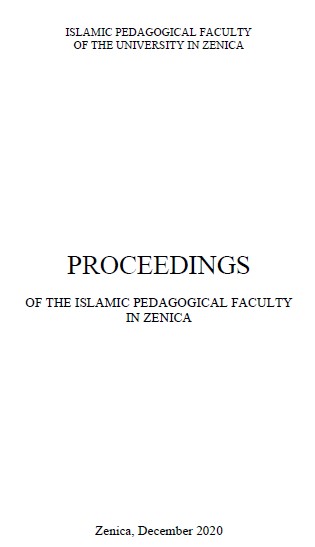EFEKTI RAZVOJA KRITIČKOG MIŠLJENJA U VJERONAUČNOJ NASTAVI
EFFECTS OF CRITICAL THINKING DEVELOPMENT IN ISLAMIC RELIGIOUS EDUCATION CLASSES
Author(s): Izet Pehlić, Maida MahmutovićSubject(s): School education, Cognitive Psychology, Sociology of Education, Sociology of Religion
Published by: Islamski pedagoški fakultet Univerziteta u Zenici
Keywords: critical thinking; Religious Education; school life quality; school climate; students’ activities;
Summary/Abstract: The subject of this research was an investigation of critical thinking development in the classes of Islamic Religious Education. The aim of the research was to find out whether there is a statistically significant difference in the quality of school life, school climate and students’ participation in class activities between traditional classes and classes in which critical thinking development is promoted. We used an experimental method, a method of theoretical analysis, and a descriptive-analytical method, and a survey technique. The following instruments were employed: the Questionnaire on the Quality of School Life (Ainley & Bourke, 1992), ISC-S Inventory – the Estimate of School Climate (Brand, Felner, Shim, Seitsinger & Dumas, 2003) and the Questionnaire on Students’ Class Activities (Gentry, Gable & Ruzza, 2002). The research was conducted in two schools in the city of Zenica, one of which was an experimental group (elementary school Mak Dizdar, Zenica) and one a control group (Elementary school Musa Ćazim Ćatić, Zenica). The research sample comprised 300 6th and 8th grade elementary school students: 150 students in the experimental group and 150 in the control group. Both groups had 75 male and 75 female students. The research findings showed that the students in the classes in which critical thinking development was promoted had a statistically significantly better quality of school life, experienced better class climate and the better quality of class activities than those who attended traditional classes.
Journal: Zbornik radova Islamskog pedagoškog fakulteta u Zenici
- Issue Year: 2020
- Issue No: 18
- Page Range: 195-226
- Page Count: 32
- Language: Bosnian

